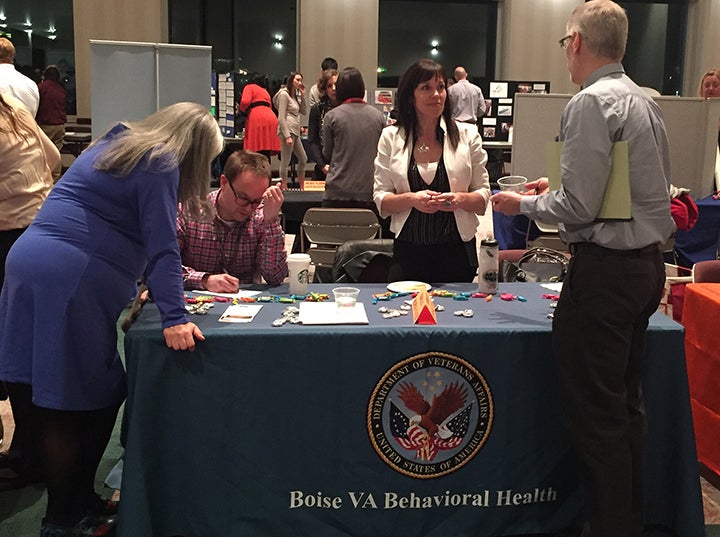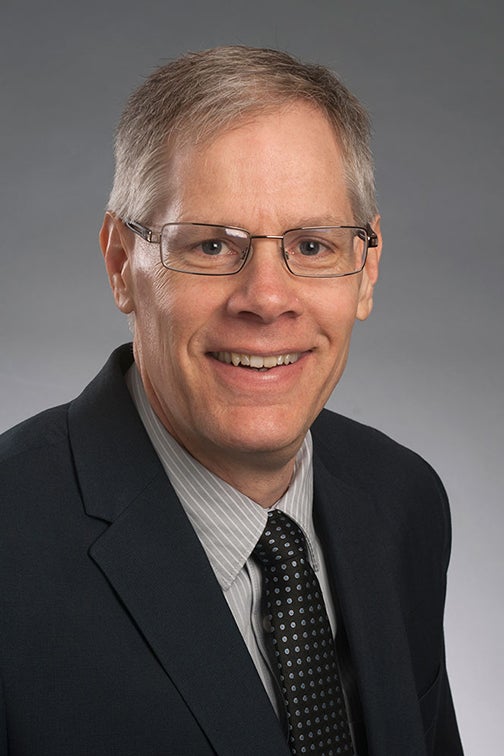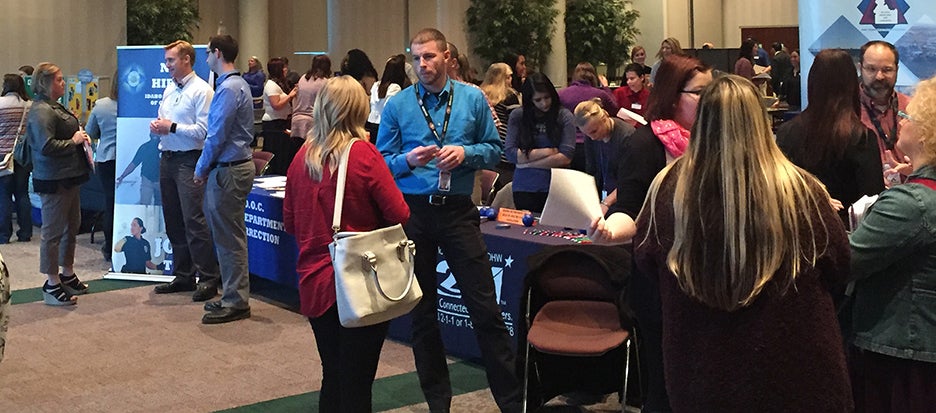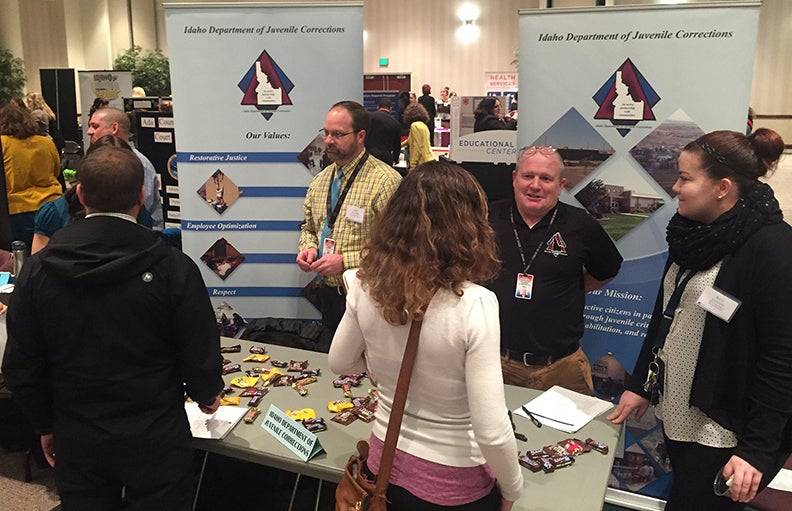
Idaho’s oldest school for social work professionals has never been more needed – and the Boise State School of Social Work students placed through the field education program have proven their value tenfold, particularly through the pandemic.

Raymond Mullenax is the director of field education and with his team, places dozens of students for practical experience each year. As is the case with many School of Social Work faculty and support staff members, he is a proud Bronco, a graduate himself of the master’s program and a licensed clinical social worker.
He has served in his current position about 10 years, but has continued to draw from his own experience as a student to build a vibrant, thoughtful and highly caring placement program.
He knows, for example, that the placements a student might not think of can turn out to be life-changing. That was the case for him, when he was redirected from his initial interests around therapy to work with children – and it all started with an early internship.
Boise State has been offering bachelor’s degrees in social work since the 1960s, and a master’s level component was built out about 25 years later. Throughout, students have worked with professionals in the varied fields of social work to hone their skills. Larger schools – the University of Washington, Seattle University, Portland State University – have routinely offered these experiences in more urban settings.
But Mullenax and the field team have built a nationwide network of contacts and agencies that return, semester after semester, to support Boise State’s budding social workers, who then join the network and support the students who follow them.
“One of the strengths of our program has been the field agencies. They’re willing to take the students and mentor them,” he said.
“They really do it because they care about the students. They’re all so committed to our professions, our ethics and the next generation of social workers that will take over for us,” Mullenax said. “They are so committed to the students, year after year.
“It’s a pleasure to work with them.”
The focus in social work education has shifted over time, and the field instruction and practice have become increasingly integral to the course of study and the degree.
And no matter how great the classroom professors and faculty members are, it continues to be the case that the field placements leave the most vivid imprint on social work students’ minds and memories, lingering long after “Pomp and Circumstance” fades away.
At any given point, Mullenax and his team of field coordinators are juggling about 500 placements in and around Boise State’s main campus in Boise, sites in Twin Falls and Coeur d’Alene and for hundreds of students in the MSW online program throughout the United States.

The internships span the range of human experiences and take place in medical settings, schools, mental health and veterans services, on the university campus itself, in federal offices and other government institutions and in settings that serve young people, the homeless and people with disabilities. Hospitals, for- and non-profit clinics, school districts and state and federal care agencies take part. Among the many long-standing partner organizations are:
- The Boise Veterans Administration Medical Center, where students work with veterans;
- The State of Idaho Department of Health and Welfare, where students have the opportunity to work on issues having to do with children, families, adult and child mental health, child protection, disabilities and policy;
- Tidwell Social Services, where they work primarily with refugees;
- El Ada Community Action Network, where the work is primarily with low-income individuals and families in need of assistance with housing, utilities and other support;
- Ada County Juvenile Courts, working with youth and families involved in the court system; and
- The Idaho State Veterans Home, working mostly with older veterans and those needing long-term living care
Increasingly, mental health at all levels is an area of emphasis, so social work interns take part in and are exposed to approaches to treatment, therapy, case management support and care in neonatal and hospice units, ERs, on the main floors of hospitals and in shelters. They help with safety assessments, case management and client placement. Some become involved in policy, education, human rights and legislation.
The team maintains a database of more than 1,000 agencies, about 400 of which are in Idaho. Matches start with a “field fair,” during which students can learn more about the work of various organizations and the placement opportunities (during the pandemic, Mullenax and the team shifted to an online format to ensure continuity of the experience for students).
Mullenax and the coordinators help students narrow their choices, and it’s up to students to schedule interviews and otherwise tack down their commitments.
“It’s hard to tailor to everyone’s interests,” he said. “If I can get them to their dream internship, it’s great. … I ask them to keep an open mind. We’re giving you a good, generalist experience in social work, so keep an open mind to what can happen …
“They have a really rich experience.”

Very caring people are drawn to social work, and it’s often the case that students believe they’ll be most effective in settings that they may have been served by in their own lives. Mullenax and the team want to make sure no one gets hurt if mental or emotional vulnerability is still on the surface for well-meaning but vulnerable students.
Feedback can be another challenge for students, so the team works closely to ensure professionalism and students’ ability to receive input.
It’s working – and perhaps even better than intended. The need for social workers has exploded as the result of the pandemic, older social workers are leaving the profession and mid-career professionals are moving up, and the Boise State social work students, placed for the experience before they are licensed professionals, are flying off the shelves. Last year, during the pandemic, Mullenax was working mostly with master’s-level students; it was the first time most had secured jobs before they had finished the program.
“It’s very common for students to work their way into a job,” Mullenax said. “It happens frequently.
“It’s a great opportunity for the agencies to get to know the student,” he said. “It’s a really good outcome for them to have jobs at the end, but it’s not something that’s explicitly stated.”
The placements, and the quality of the Boise State students’ contributions, have made the program and the professionals it produces highly attractive.
“I’m really proud of the quality of students we get overall and how we help develop them into professional social workers doing case management, policy, and clinical work in the community,” Mullenax said. “I often hear from community partners that they prefer working with our students and hiring them once they graduate.”
He credits his team for having built a program that is not only memorable to participants, but valuable to agencies and organizations far beyond Boise.
“I’m proud of our field team for providing good support to students through the process of field placement and while they are in placement. Many programs just tell their students to go and find their own placement, and that is so far from what we do in our program,” he said. “We hear from agencies not only in Idaho, but around the country, how they appreciate the support we provide both them and students.”
“The entire field team really cares about how students develop professionally with hopes that they will represent our university well, as well as the profession of social work– and that clients will receive the best treatment and ethical care from our students and graduates.”